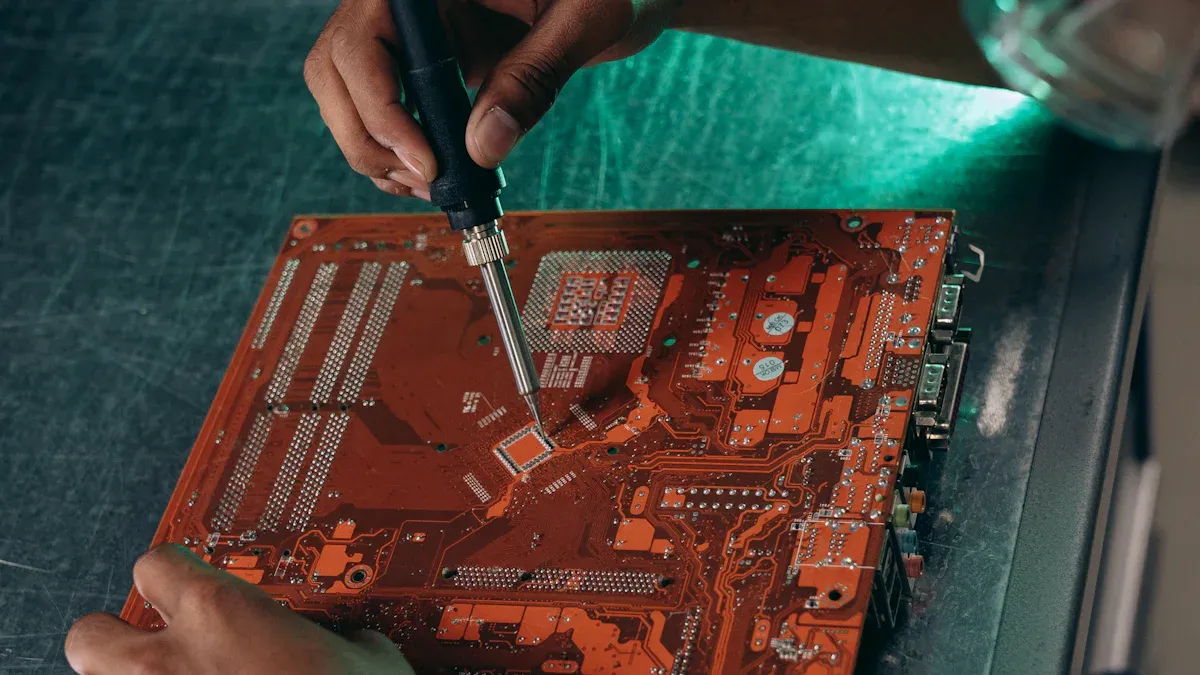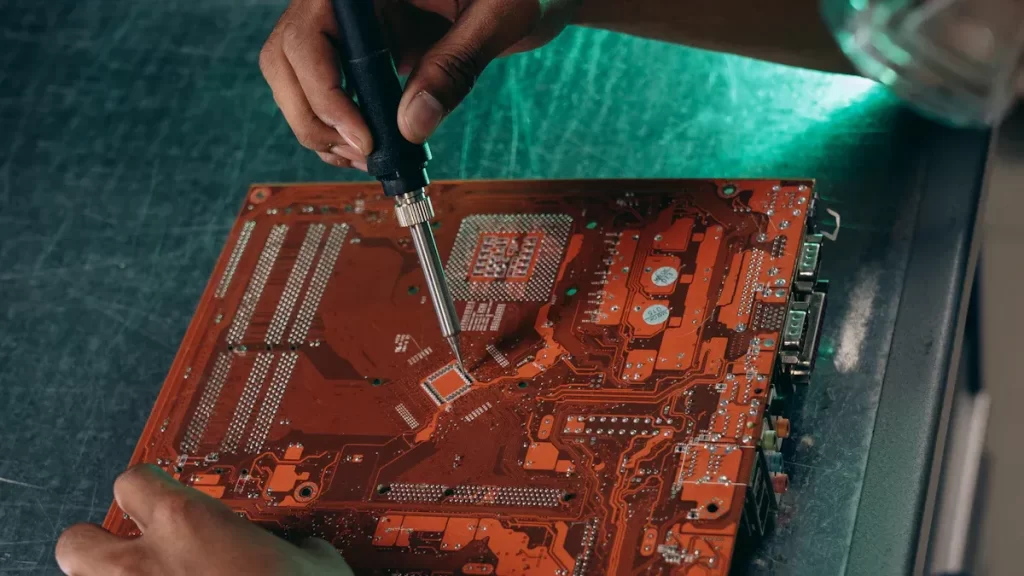
Have you thought small-batch PCBA always costs a lot? Many people think this, but it’s not fully true. Using smart strategies can save money and keep good quality. Planning well and choosing a reliable PCBA manufacturing company is important. Their skills help cut waste, find materials easily, and speed up work.
With these ideas, small-batch production can stay affordable.
Key Takeaways
Small-batch PCBA can be cheaper with smart planning. Pick good manufacturers to save money and time.
Use simple PCB designs with Design for Manufacturability (DFM). This lowers errors, speeds up work, and keeps quality steady.
Work with trusted PCB makers for small, good materials. Their strong supply chains prevent delays and keep standards high.
Add automation and AI to production steps. These tools make work faster, cheaper, and improve quality checks.
Cut waste by using better processes. Set clear goals and use lean methods to save money and help the environment.
Key Cost Factors in Small-Batch PCBA Production
Setup and Tooling Costs
Making small-batch PCBs can get expensive fast. Each new PCB design needs its own setup, like adjusting machines and making stencils. These costs are shared by fewer units, so each one costs more. For example, testing designs often needs many setups, which raises the total cost.
Also, making high-quality PCBs needs special tools and careful work. This takes more time and money. Small-batch production doesn’t spread costs over many units, making it pricier. Here’s a simple comparison:
Production Size | Cost Effects |
|---|---|
Small-Batch | Higher cost per unit due to setup expenses |
Large-Batch | Lower cost per unit by spreading setup costs |
Knowing these costs helps you plan better. Work with PCB makers who have smart setup methods.
Problems Getting Materials for Small Batches
Finding parts for small-batch PCBs can be hard. Many suppliers sell in big amounts, so getting just what you need is tough. This can make costs go up or cause delays.
Keeping quality is another issue. Using bad parts can cause problems and cost more later. Differences in part sizes or materials can mess up the process and hurt quality.
To fix this, team up with trusted PCB makers. They have good supply chains and can get quality parts in small amounts.
Inefficiencies in Small-Scale Production
Small-scale production often wastes time and money. Manual work is common, which slows things down and costs more. Without automation, these problems can hurt your budget.
Small batches may also lack smooth workflows, wasting resources. Advanced PCB services can help by using automation and better processes. This cuts waste and boosts efficiency, even for small jobs.
Fixing these issues needs smart planning. Work with skilled electronic manufacturers to find and solve problems. This makes production smoother and saves money.
Quality assurance and testing for limited runs
Making sure small-batch PCBs are high-quality can be tricky. But it’s very important. Even one mistake can cause big delays or extra costs. How can you ensure every PCB is perfect? The answer is using the right tests and quality checks.
Using proven methods helps keep things consistent. For example, Statistical Process Control (SPC) tracks production with data. It finds problems early and lowers defect risks. Lean Manufacturing also helps by cutting waste and improving efficiency. This saves time and ensures your PCBs meet strict standards.
Here’s a simple table of key practices for better quality:
Methodology | Description |
|---|---|
Statistical Process Control (SPC) | Tracks production with data to catch problems early. |
Lean Manufacturing | Reduces waste and improves workflow for fewer defects. |
Continuous Improvement | Keeps improving processes to ensure better quality over time. |
Design for Manufacturability (DFM) | Makes PCB designs easier to produce, reducing assembly errors. |
Fabrication Standards | Ensures PCBs meet exact specs for consistent quality. |
Automated Optical Inspection (AOI) | Spots defects like soldering errors or misalignments during assembly. |
Testing is also very important. Automated Optical Inspection (AOI) is a great tool. It uses images to find issues like bad soldering or misaligned parts. It works fast and accurately, which is perfect for small batches. Catching problems early saves money later.
Think about Design for Manufacturability (DFM) when designing PCBs. It makes designs easier to build and reduces mistakes. Pairing DFM with continuous improvement creates a system that gets better over time.
In small-batch production, every PCB matters. Focus on quality checks and smart testing to make reliable products. Work smarter, not harder, to save money and time.
Strategies to Save Costs in Small-Batch PCBA Production
Make PCB Designs Easier to Build
You’ve heard “work smarter, not harder,” right? That’s what Design for Manufacturability (DFM) does. It makes small-batch PCB production simpler and less prone to mistakes.
DFM helps by improving how PCBs are designed. For example, placing parts wisely and routing traces better can avoid problems. When designs are easier to build, fewer errors happen. This saves both time and money.
Think of it like this: if your PCB is simple to make, you’ll spend less fixing mistakes. Companies using DFM often work faster and avoid costly issues.
Why is DFM important?
It reduces mistakes during assembly.
It speeds up production by avoiding delays.
It keeps quality consistent for every unit.
Work with skilled PCB manufacturers who know DFM well. They’ll help you create designs that are easy to produce, even in small amounts.
Team Up with Trusted PCBA Makers for Materials
Getting parts for small-batch PCBs can be tricky. Many suppliers sell in large amounts, making it hard to buy just a little. That’s where reliable PCB makers can help.
These companies have strong supply networks. They can get good-quality parts in small amounts without costing too much. Plus, they check every part to meet high standards.
Here’s what to look for in a good partner:
Feature | What It Means |
|---|---|
Quality Checks | Ensures all parts meet strict rules. |
Advanced Tools | Uses modern machines for faster, better production. |
Helpful Support | Quick answers and advice for smooth teamwork. |
Good PCB makers don’t just find parts—they bring smart tools and knowledge. They can combine suppliers, simplify steps, and lower costs. For example, one company saved $8,700 monthly by switching materials and working with a trusted partner.
When you work with experts who focus on quality and efficiency, you’ll notice big savings.
Use Smart Tech Like Automation and AI
Imagine machines doing repetitive tasks perfectly, while AI spots problems early. That’s how automation and AI improve small-batch PCB production.
Automation replaces manual work, making tasks like placing parts, soldering, and checking faster and cheaper. Here’s a quick cost comparison:
Task | Manual Cost/Unit | Automated Cost/Unit | Savings (10k units/year) |
|---|---|---|---|
Part Placement | $0.38 | $0.12 | $2,600 |
Soldering | $0.27 | $0.09 | $1,800 |
Inspection | $0.15 | $0.04 | $1,100 |
AI goes further by analyzing data to fix slowdowns and improve workflows. For example, factories using AI boosted output by 5% in two months. AI also finds defects better, ensuring only top-quality PCBs are made.
What do automation and AI offer?
Faster production times.
Fewer mistakes.
Better inspections with over 90% accuracy.
Using these tools makes small-batch production as efficient as large-scale manufacturing. Partner with PCB makers who use automation and AI to stay ahead.
Reducing waste through efficient production processes
Waste in small-batch PCBA production hurts profits and the environment. Using better processes can save money and reduce waste. Here are simple ways to make production more efficient:
Set clear waste reduction goals: Aim for specific targets. For example, cutting waste by 25% each quarter can lead to big savings by year-end. This helps both your budget and sustainability.
Adopt a pull-based system: Make products only when needed. This avoids making too much or storing extra items, which wastes resources.
Preventive maintenance: Check machines often to avoid breakdowns. Fixing problems early stops delays and saves materials.
Reduce packaging waste: Use less packaging like Apple did. They saved billions by shipping with smaller boxes. Small changes can make a big difference.
Using Lean Manufacturing ideas helps cut waste and improve workflows. Fixing common issues like overproduction and defects makes production smoother. Better processes also improve product quality.
Think of waste reduction as a long-term goal. Keep improving step by step. Small changes add up to big savings over time.
Collaborating with top PCB assembly manufacturers for expertise
Working with skilled PCB assembly manufacturers can improve small-batch production. These experts help lower costs and make processes better. Here’s how they help:
First, they offer flexible order sizes. Whether you need a few units or many, they keep costs low. For example, tiered pricing saves money as orders grow.
Second, they handle logistics in-house. This reduces delays and cuts costs by up to 12%. You can focus on your product without worrying about supply chain issues.
Here’s how their skills bring real benefits:
Benefit Description | Improvement Metrics |
|---|---|
Flexible order sizes with tiered pricing | Saves money at all project levels |
Faster logistics through vertical integration | Cuts costs by 8–12% |
Better panel layouts for large orders | Reduces costs by 25–40% |
Combining PCB designs on shared panels | Uses ≥80% of materials efficiently |
Bulk discounts for prepreg materials | Saves money through consolidation |
Top manufacturers also use smart techniques like batch processing. They combine PCB designs on shared panels to use materials better. This can save over 80% of resources and lower costs.
Partnering with these experts gives you access to their tools and knowledge. Their help makes small-batch production cheaper and more efficient. Working with the right manufacturer is a smart way to stay competitive.
Advantages of Optimized Small-Batch PCBA Production
Flexibility for prototyping and niche applications
Optimized small-batch PCBA lets you try new ideas easily. Whether testing designs or making products for specific industries, small batches help you adjust quickly. You can change designs, test features, and improve without making too many units.
For special uses, this flexibility is very helpful. Think about creating electronics for medical devices or aerospace. Small batches let you meet strict rules while staying flexible. With tools like 3D-printed PCBs, custom designs are faster to make.
Here’s why it’s important:
Quick changes: Update designs without wasting materials.
Affordable testing: Try ideas without spending too much.
Custom solutions: Fit unique needs for special markets.
This method helps you stay ahead in competitive industries.
Faster time-to-market for innovative products
Speed matters when launching new products. Optimized small-batch PCBA helps you move faster. Better processes and lean methods cut delays. By fixing slow steps, you can focus on delivering your product.
For example, teamwork between departments improves communication. This helps everyone work better together. Managing inventory just in time also reduces waiting for parts.
Key Benefit | How It Helps |
|---|---|
Better processes | Fixes delays, helping faster decisions. |
Team collaboration | Improves teamwork, speeding up innovation. |
Lean methods | Cuts waste and shortens production time. |
When time is critical, these steps make a big impact. You’ll launch quicker and stay ahead of others.
Lower financial risk compared to large-scale production
Small-batch PCBA lowers money risks. Instead of spending big on large production, start small. This way, you can test the market before investing more.
Turnkey PCB services make this easier. They handle everything, so you don’t need many vendors. This saves money and keeps quality steady.
Here’s how it helps:
Lower starting costs: Spend less on parts and production.
Test the market: Check demand before making more.
Less waste: Avoid making too much or storing extras.
This is great for startups and small businesses. You can focus on creating without worrying about big costs.
Quick response to market trends and customer needs
Keeping up with trends is important in electronics. Small-batch PCBA helps you adjust fast to what customers want. Whether it’s smaller gadgets or new features, you can make changes quickly.
The PCB market changes fast. People want tiny devices with smart features. Think of phones, smartwatches, or IoT gadgets. By improving small-batch production, you can test new ideas and meet these needs without wasting time or materials.
Eco-friendly products are also popular now. Customers like green products, and the PCB industry is adapting. Using recyclable materials and saving energy is good for the planet and your business. It shows you care about what matters to your customers.
Picking the right PCBA partner is very important. Factories with certifications like ISO 9001 focus on quality. This means fewer mistakes and better products. When customers trust your products, they’ll keep buying from you.
Automation and AI are also helpful. They make production faster and more accurate. AI can find problems early, saving time and money.
By staying flexible and choosing good partners, you can follow trends and meet customer needs. Small-batch production isn’t just about making less—it’s about making the right products at the right time.
Picking a Trustworthy PCBA Manufacturer for Small-Batch Production
Choosing the right PCBA manufacturer is very important. A good partner ensures quality, saves money, and works efficiently. But how do you pick the best one? Let’s make it simple.
What to Look for in Reliable PCBA Manufacturers
When choosing a manufacturer, focus on key things that matter. Here’s what to check:
Price: Fair costs without losing quality.
Quality System: Strong systems for consistent results.
Certifications: Look for ISO 9001 or similar approvals.
Technical Expertise: Skilled engineers for tricky designs.
Manufacturing Capacity: Can handle small-batch orders well.
Audit Results: Good reviews from past checks.
Reliable manufacturers often use Engineering Verification Builds (EVB). This process finds design problems early. It ensures the final product works as planned. EVB shows the manufacturer cares about reliability.
Evaluation Criteria | What It Means |
|---|---|
Reliability Capability | Ensures the supplier meets high standards for better products. |
Supplier Assessment | Rates suppliers based on their reliability and past performance. |
Reliability Management | Focuses on keeping reliability strong across the supply chain. |
Why Experience Matters in Small-Batch Production
Experience is key for small-batch production. Skilled manufacturers know how to handle small runs. They work fast, waste less, and deliver great results.
For example, JLCPCB is great for quick prototypes and affordable solutions. They finish jobs fast, perfect for small batches. PCBCart has over 10 years of experience, making them reliable for special projects.
Manufacturer | Strengths | Performance Highlights |
|---|---|---|
JLCPCB | Fast prototypes, cost-effective | Quick delivery for small runs and prototypes |
PCBCart | Reliable, experienced | Over 10 years in the field, adaptable to needs |
Working with experienced manufacturers lowers risks and makes production smoother.
Checking Technology and Skills of PCB Assembly Makers
Technology is very important for small-batch production. Advanced tools help make precise products, reduce mistakes, and speed up work. When picking a PCB assembly maker, look for these:
Material Quality: Good materials last longer.
Fabrication Precision: Accurate production avoids errors.
Assembly Options: Can handle different designs easily.
Turnaround Time: Fast delivery without losing quality.
Customer Support: Helpful teams that solve problems quickly.
Manufacturers using automation and AI are better. These tools make work faster, improve quality checks, and save money. Flexible processes and strict quality tests show they care about doing a great job.
By focusing on these points, you’ll find a manufacturer who fits your small-batch needs perfectly.
Checking Customer Support and Communication Skills
Picking a PCBA manufacturer with good support is very important. Imagine asking questions about your project but getting no reply. That would be frustrating! Choose manufacturers who answer quickly and clearly.
Good support helps fix problems fast. If there’s a design issue, a helpful team can guide you before production starts. This saves both time and money.
How can you check their communication? See how fast they reply to emails or calls. A good manufacturer keeps you updated during every step of production. They won’t leave you guessing.
Also, their team should know a lot about PCBA. They should explain hard ideas in simple ways. They might even suggest ways to improve your design for better results. Look for certifications like ISO 9001 or IPC standards. These show they care about quality and reliability.
Here’s a simple table of what to check:
Feature | Why It Matters |
|---|---|
Certifications | ISO 9001 or IPC standards show focus on quality. |
Inspection Tools | AOI, X-ray, and ICT testing catch mistakes early. |
Proven Experience | Reliable manufacturers have a history of successful projects. |
Lastly, pick a manufacturer with a friendly team. They should listen to your needs and help solve problems. A great support team feels like part of your own company.
By focusing on these points, you’ll find a manufacturer who makes quality products and keeps the process easy. Good communication leads to better results!
Making small-batch PCBA doesn’t have to be hard. Focus on smart ideas like better designs, cutting waste, and using new tools. These steps save money while keeping good quality. Working with a trusted PCBA company gives you expert help, smooth processes, and top materials.
A good PCBA company saves time and avoids extra costs. They help solve problems and reach your goals. Try new ideas, team up with experts, and make your small-batch PCBA work well.
FAQ
What makes small-batch PCBA production expensive?
Setup costs are the main reason. Each new design needs machine changes, stencils, and adjustments. These costs are divided among fewer units, raising the price per unit. Choosing manufacturers who simplify setups can lower these costs.
How do I make sure small-batch PCBs are high quality?
Focus on testing and checking. Use tools like Automated Optical Inspection (AOI) to find mistakes early. Design for Manufacturability (DFM) helps avoid errors during assembly. Working with skilled manufacturers keeps quality steady.
Is using automation and AI helpful for small-batch production?
Yes, it is! Automation makes tasks like soldering and inspections faster. AI studies data to improve processes and find problems. These tools save time, cut mistakes, and reduce costs, even for small batches.
How can I pick the best PCBA manufacturer?
Look for certifications like ISO 9001, good customer service, and modern tools. Check if they have experience with small-batch orders. Reliable manufacturers offer fair prices, quick replies, and consistent results.
Can small-batch production help me try new ideas?
Definitely! Small batches let you test and change designs without spending too much. You can try features, adjust to trends, and innovate easily. This makes it great for creative projects and special markets.
See Also
Speeding Up PCBA Production While Maintaining High Standards
Expert Techniques for Achieving Superior PCBA Manufacturing Quality
Streamlining PCBA Manufacturing: Key Steps From Order To Delivery
Comparing Turnkey And Consignment PCBA Manufacturing Approaches
Achieving Rapid 24-Hour Turnaround For Quality PCBA Production





